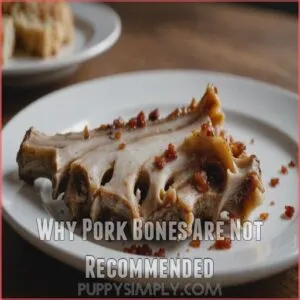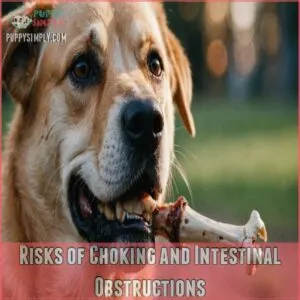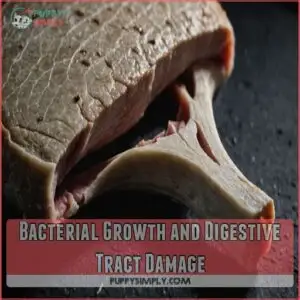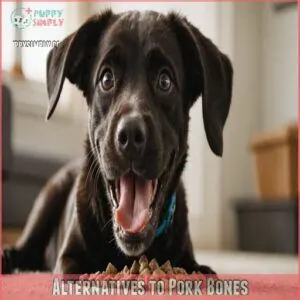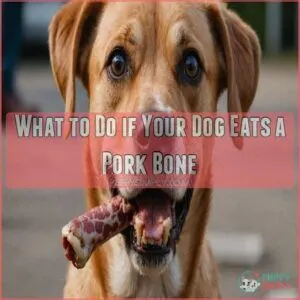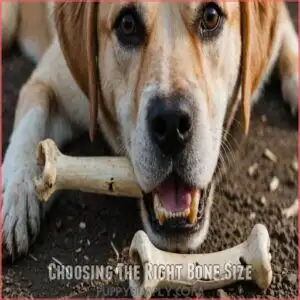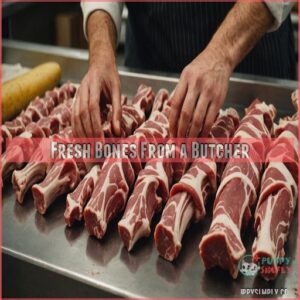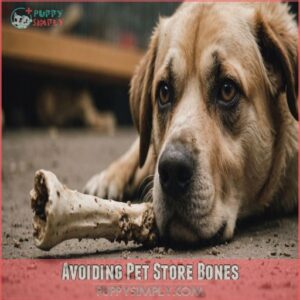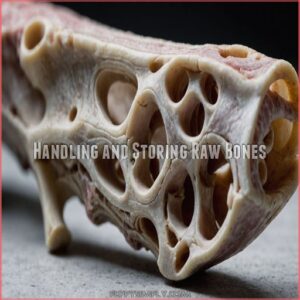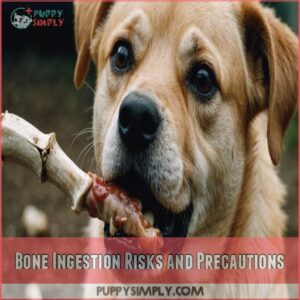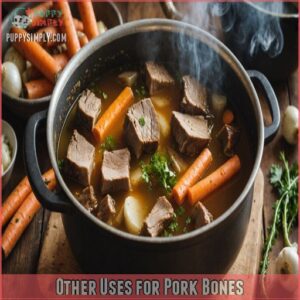This site is supported by our readers. We may earn a commission, at no cost to you, if you purchase through links.
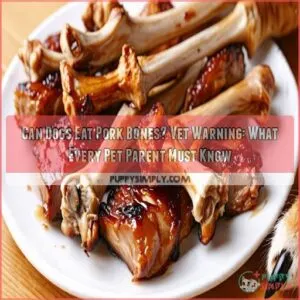 No, you shouldn’t let your dog eat pork bones.
No, you shouldn’t let your dog eat pork bones.
While your pup might give you those irresistible puppy eyes at the dinner table, these bones are dangerous chew toys.
Cooked pork bones splinter easily and can puncture your dog’s throat or intestines – nobody wants an emergency vet visit!
Even factory-farmed pork bones pose additional risks Learn About Raw Bone Safety, but even raw pork bones carry risks of bacterial infections and choking.
Just like you wouldn’t give a toddler a sharp object to play with, it’s best to keep these hazards away from your furry friend.
There are plenty of safer alternatives that’ll keep your dog’s tail wagging and your mind at peace.
Table Of Contents
- Key Takeaways
- Dangers of Pork Bones
- Alternatives to Pork Bones
- What to Do if Your Dog Eats a Pork Bone
- Safe Bone Options for Dogs
- Bone Ingestion Risks and Precautions
- Other Uses for Pork Bones
- Frequently Asked Questions (FAQs)
- Can dogs eat pork chop bones?
- What happens if a dog eats a pork bone?
- Can dogs eat pork rib bones?
- Can dogs eat raw pork leg bones?
- Are cooked pork bones safe for dogs?
- What kind of bones can dogs eat?
- Why can’t dogs eat pork?
- How long does it take for a dog to digest a pork bone?
- How long does it take to digest pork bones?
- Can puppies be given pork bones to chew?
- Do different dog breeds handle pork bones differently?
- Is pork shoulder bone safer than other parts?
- Whats the difference between smoked and raw bones?
- Conclusion
Key Takeaways
- You shouldn’t feed your dog pork bones as they can splinter easily and puncture their throat or intestines, potentially leading to emergency surgery.
- However, if your dog does eat a pork bone, especially a splinter-prone raw pork femur bones, you’ll want to contact your vet immediately if your dog eats a pork bone, and watch for warning signs like vomiting, lethargy, or bloody stool within the next 72 hours.
- You can safely use pork bones to make nutritious bone broth for your dog by simmering them in water for up to 24 hours, but make sure to strain out any bone fragments.
- You’ll find safer alternatives in bully sticks, dental chews, or large raw cow bones from trusted butchers – just make sure they’re roughly the size of your dog’s head to prevent choking.
Dangers of Pork Bones
If you’ve ever caught your dog eyeing those leftover pork bones after dinner, you’ll want to resist those pleading puppy eyes since pork bones can splinter and cause serious damage to your pet’s digestive system.
You’re better off choosing safer alternatives like bully sticks or dental chews, which won’t put your furry friend at risk of choking or internal injuries.
Why Pork Bones Are Not Recommended
Your lovable pup might give you those pleading eyes when you’re enjoying pork ribs, but pork bones are a definite no-go for dogs. Here’s why veterinarians strongly advise against them:
- Pork bones splinter more easily than other types
- They’re often cooked, making them brittle and dangerous
- The high fat content can trigger pancreatitis
- They harbor harmful bacteria even when raw
- Their shape makes them prone to getting stuck in teeth
Risks of Choking and Intestinal Obstructions
Pork bones can become lodging hazards in a dog’s throat, especially when broken into smaller pieces.
Think of them like sharp puzzle pieces that don’t fit anywhere safely.
The bone fragments might block the intestines, leading to emergency surgery.
Dogs of different sizes face varying risks – what’s manageable for a Great Dane could be deadly for a Chihuahua.
Always match bone size to your pup’s breed.
Bacterial Growth and Digestive Tract Damage
Raw bones can harbor dangerous bacteria like Salmonella and E. coli, even when properly stored.
These pathogens multiply rapidly at room temperature, potentially causing severe digestive upset in your dog.
Sharp bone fragments can also scrape or puncture the digestive tract as they move through, leading to serious internal injuries.
Remember, what seems like a harmless treat could turn into an expensive vet visit.
Alternatives to Pork Bones
If you’re looking for safer alternatives to pork bones, you’ll find plenty of vet-approved options that your dog will love just as much.
From large raw cow bones to digestible bully sticks, these alternatives can satisfy your pup’s natural urge to chew while keeping them safe.
Large, Raw Cow Bones
When considering raw bones for your dog, fresh cow bones from trusted butchers offer a safer alternative to pork bones.
Look for bones roughly the size of your dog’s head to prevent choking hazards.
You’ll want to properly store them in the refrigerator between chewing sessions and discard after 4 days.
Always supervise chewing time and consult your vet about specific size recommendations.
Large, Raw Bison Bones
Bison bones offer a robust alternative for your four-legged friend’s chewing needs.
Here’s what makes them stand out:
- Denser structure than beef bones, lasting longer for power chewers
- Natural marrow content provides essential nutrients
- Typically sourced from free-range bison, reducing chemical exposure
- Size options suitable for dogs over 40 pounds
- Less likely to splinter compared to other raw bones
Always get them fresh from a trusted butcher and supervise chewing sessions.
Bully Sticks and Rawhides
Looking for safer alternatives to pork bones? Bully sticks offer excellent digestibility and come from pure beef muscle, making them a reliable choice for your pup.
While some vets approve high-quality rawhides made from 100% beef or horse hide, be cautious – many contain artificial flavors and chemicals. Stick to trusted brands and always supervise your dog’s chewing sessions to prevent choking hazards.
Dental Chews for Dogs
Raw pork ribs can pose significant health risks to dogs, including the presence of harmful bacteria like Salmonella. Dental chews offer a safer alternative to pork bones while keeping your pup’s teeth clean. Unlike rawhides, these specially designed treats help freshen breath and reduce plaque buildup.
- They’re digestible and break down naturally
- Most have ridges that scrub away tartar
- They come in sizes perfect for every dog breed
Just remember to supervise chewing time and pick the right size for your furry friend.
What to Do if Your Dog Eats a Pork Bone
If you’ve caught your dog munching on a pork bone, don’t panic – but you’ll need to act quickly to prevent potential health issues.
You’ll want to remove any remaining bone pieces right away and watch your pup closely for signs of distress, while having your vet’s number ready just in case.
Step 1: Remove The Bone Immediately
If you catch your dog with a pork bone, quick action is vital.
Remember – a fast response could save your pup’s life.
First, approach calmly to avoid making them guard or swallow the bone.
| Action | Do’s | Don’ts |
|---|---|---|
| Approach | Stay calm | Don’t panic |
| Command | Use "drop it" | Don’t chase |
| Removal | Trade for treat | Don’t force grab |
| After | Secure trash | Don’t scold |
Step 2: Monitor for Signs of Distress
Keep a close eye on your dog after removing the bone.
Watch for warning signs like vomiting, unusual lethargy, or abdominal bloating – they’re your dog’s way of saying something’s wrong.
Be aware that if your dog has ingested a pork bone splinter, it can cause serious internal damage.
Pay attention to bathroom habits too; constipation or bloody stool means trouble.
Don’t wait it out if you spot these red flags. Your pup can’t tell you what’s wrong, but their body language will.
Step 3: Contact Your Veterinarian
Your veterinarian should be your next call, even if your dog seems fine after eating a pork bone.
Give them specific details about the bone’s size and when your dog ate it.
They’ll assess the situation and might recommend bringing your pup in for an exam.
Don’t wait for symptoms to appear – early intervention can prevent serious complications and give you peace of mind.
Step 4: Watch for Changes in Stool and Behavior
Close monitoring becomes your top priority after a pork bone incident.
Watch for changes in stool consistency by consulting a dog stool chart to identify any abnormal patterns – any blood or abnormal color needs immediate vet attention.
Track their energy levels too, since lethargy or appetite changes could signal trouble.
You’ll want to note any vomiting or distress signs for the next 72 hours.
It’s like being a pet detective, where every clue matters.
Safe Bone Options for Dogs
While pork bones aren’t safe for your furry friend, you’ll find plenty of better options that can satisfy your dog’s natural urge to chew.
You can choose from raw meaty bones almost as large as your dog’s head, bully sticks that help clean teeth, or specially designed dental chews that provide a safer alternative to traditional bones.
Choosing The Right Bone Size
When selecting bones for your dog, think of them like shoes – they need to fit just right.
Pick bones almost as large as your dog’s head to prevent choking.
Small breeds need smaller, denser bones while large breeds can handle thicker ones.
Consider your dog’s age and chewing style too – aggressive chewers need sturdier options.
Remember, one size doesn’t fit all in terms of safe chewing.
Fresh Bones From a Butcher
A trusted butcher is your best friend in terms of getting fresh bones for your dog.
They’ll help you select bones that are both safe and appropriate.
Here’s what you should look for:
- Ask for bones cut that day – freshness matters for safety
- Request bones nearly as large as your dog’s head
- Check that bones have minimal fat content and no sharp edges
Remember to store them properly in the fridge or freezer between uses.
Avoiding Pet Store Bones
While butcher-sourced bones offer reliability, pet store bones come with hidden risks.
Unlike fresh bones, store-bought options often sit on shelves for unknown periods, potentially harboring harmful bacteria.
The origin and processing methods remain mysterious – you can’t be sure how they’ve been treated or stored.
Think of pet store bones like mystery meat – it’s better to skip them and stick with traceable sources.
Handling and Storing Raw Bones
Proper handling of raw bones requires three essential steps to keep your dog safe.
Treat them like raw meat – wash your hands thoroughly after handling and limit contact with surfaces.
You can find a variety of safe options like pork bone chews online (pork bone chews).
Store bones in the fridge between chewing sessions, and don’t keep them longer than 4 days.
For freezing, wrap bones individually and use within 6 months.
Always inspect for signs of spoilage before giving them to your pup.
Bone Ingestion Risks and Precautions
While you might think tossing your dog a pork bone is a tasty treat, you’ll need to be extra careful since these bones can cause serious problems like choking or intestinal damage.
You’ll want to watch out for three main risks when your dog has any type of bone: the chance of choking, potential bacterial growth if the bone isn’t fresh, and possible tooth damage from chewing on harder bones.
Preventing Choking Hazards and Intestinal Obstructions
Keeping your dog safe from bone-related hazards starts with smart choices.
Here’s what experienced pet parents know about preventing choking and blockages:
- Choose bones larger than your dog’s muzzle
- Replace bones once they become small enough to swallow
- Take away bones if your pup starts breaking off chunks
- Monitor chewing sessions – never leave them unsupervised
Think of bones like kids’ toys – if it’s small enough to swallow, it’s too small to keep.
Reducing The Risk of Bacterial Growth
Raw bones need careful handling to keep your pup safe from harmful bacteria.
Just like your own raw meat prep, wash your hands thoroughly before and after handling bones.
Store bones in the fridge between chewing sessions, and toss them after 4 days – bacteria love to multiply on old bones.
Clean any surfaces the bone touches with hot, soapy water to prevent cross-contamination.
Avoiding Hard Bones and Dental Damage
Hard bones can crack your dog’s teeth faster than you might think.
When choosing chew toys and treats, protect those precious canines by avoiding anything that won’t bend or give under pressure.
It’s also worth noting that certain bones, like pork bones for dogs, can be particularly hazardous due to the risk of parasitic infections.
- Watch for aggressive chewers who might fracture their teeth on hard bones
- Consider switching to dental-friendly alternatives like bully sticks
- Replace bones immediately if you notice any sharp edges or splinters
Always prioritize your pup’s dental health over traditional treats.
Other Uses for Pork Bones
While you can’t feed pork bones directly to your dog, you’ll find they’re perfect for making a nutritious bone broth that your pup will love.
You can transform these bones into tasty, dog-safe treats by simmering them in water for up to 24 hours, creating a flavorful addition to your pet’s regular meals.
Making Bone Broth for Dogs
While bones themselves pose risks, you can safely transform pork bones into a nutritious bone broth for your dog.
Simply simmer the bones in water for up to 24 hours, creating a tasty liquid packed with nutrients.
You’ll want to store leftovers in the fridge for up to 4 days, or freeze them into convenient pupsicles.
Just remember to strain out any bone fragments before serving.
Adding Flavor to Dog Food
Now that you’ve mastered bone broth, let’s spice up your pup’s dinner routine.
Adding a splash of homemade bone broth to your dog’s food can transform a boring meal into a tail-wagging feast.
To get the most out of this nutritious addition, consider using high-quality bone broth that’s rich in minerals and amino acids to support your dog’s immune system.
Just remember these flavor-boosting tips:
- Use room-temperature broth to preserve the natural aromas
- Start with small amounts to avoid tummy troubles
- Mix well to distribute flavors evenly
- Store unused portions in ice cube trays
- Label and date everything clearly
Veterinary Consultation Before Use
Before experimenting with pork bones or bone broth, check with your vet.
They’ll consider your dog’s size, age, and health history to give personalized advice about bone safety.
If you’re looking for suitable alternatives, safe dog bone chews can be a great option.
Your vet knows your pup’s specific needs and can recommend the right alternatives if pork bones aren’t suitable.
Remember, what works for one dog mightn’t work for another – that’s why professional guidance matters.
Frequently Asked Questions (FAQs)
Can dogs eat pork chop bones?
Don’t give your dog pork chop bones, as they are more likely to break into shards and cause internal injuries, especially when cooked, see pork bones risks. Don’t give your dog pork chop bones.
They’re dangerous since they can splinter and cause serious injuries to your pet’s mouth, throat, or digestive system.
It’s better to opt for safe alternatives.
What happens if a dog eats a pork bone?
If your dog eats a pork bone, watch for choking, vomiting, or bloody stool.
Contact your vet immediately – pork bones can splinter, causing serious internal damage.
Monitor them closely for the next few days.
Can dogs eat pork rib bones?
Pork rib bones, which carry a risk of pork rib bone hazards, are particularly worrisome for pet parents. Pork rib bones are dangerous for your dog – they can splinter and cause serious internal injuries.
Whether raw or cooked, it’s best to avoid them completely.
Try safe alternatives like bully sticks instead.
Can dogs eat raw pork leg bones?
You’re barking up the wrong tree if you’re thinking about giving your dog raw pork leg bones.
They’re not safe, as they can splinter, cause choking, and harbor harmful bacteria.
Stick to vet-approved chew toys instead.
Are cooked pork bones safe for dogs?
Never feed your dog cooked pork bones, as they can cause serious health issues, including bone splinters and intestinal puncture. Never feed your dog cooked pork bones.
They’re extremely dangerous and can splinter easily, causing serious internal injuries.
They can puncture your dog’s digestive tract or cause choking.
Stick to safer chewing alternatives instead.
What kind of bones can dogs eat?
Large raw bones from a butcher are your best bet – they’re safer than cooked ones.
Stick to bones almost as big as your dog’s head, and consider alternatives like bully sticks or dental chews.
Why can’t dogs eat pork?
Pork bones pose serious risks to your dog’s safety.
They’re prone to splintering when chewed, which can cause internal injuries, choking hazards, and digestive blockages.
It’s best to avoid them entirely.
How long does it take for a dog to digest a pork bone?
Dogs can’t properly digest pork bones at all – they’ll pass through in 24-72 hours if you’re lucky.
But don’t wait it out – call your vet immediately since bones can cause serious internal damage.
How long does it take to digest pork bones?
Bones aren’t actually digestible – they’ll pass through your dog’s system in 12-72 hours if they’re small enough.
However, you shouldn’t feed pork bones to dogs as they can cause serious complications.
Can puppies be given pork bones to chew?
Like playing with fire, giving pork bones to puppies is dangerous.
They’re way too hard for developing teeth and can splinter easily.
You shouldn’t give your puppy pork bones – stick to vet-approved chew toys instead.
Do different dog breeds handle pork bones differently?
While breed size impacts chewing strength, all dogs face the same risks from pork bones.
You shouldn’t give them to any breed, as they’re equally dangerous for breaking teeth and causing internal injuries.
Is pork shoulder bone safer than other parts?
Just as a sleeping lion looks harmless, pork shoulder bones aren’t safer than other pork bones.
They’re still dangerous for your dog, carrying the same risks of splintering and causing internal injuries.
Skip them entirely.
Whats the difference between smoked and raw bones?
Raw bones are softer and more digestible, while smoked bones are processed and can splinter easily.
You’ll want to avoid smoked bones completely – they’re dry, brittle, and dangerous for your dog’s health.
Conclusion
Regarding pork bones, it’s better to be safe than sorry.
While your dog might look at you like you’re the worst parent ever, remember that you’re protecting them from serious harm.
Can dogs eat pork bones? The answer is a firm no.
Instead, opt for safer alternatives like specialized dental chews or large raw beef bones from your butcher.
Your pup’s health is worth more than a moment of chewing satisfaction.

